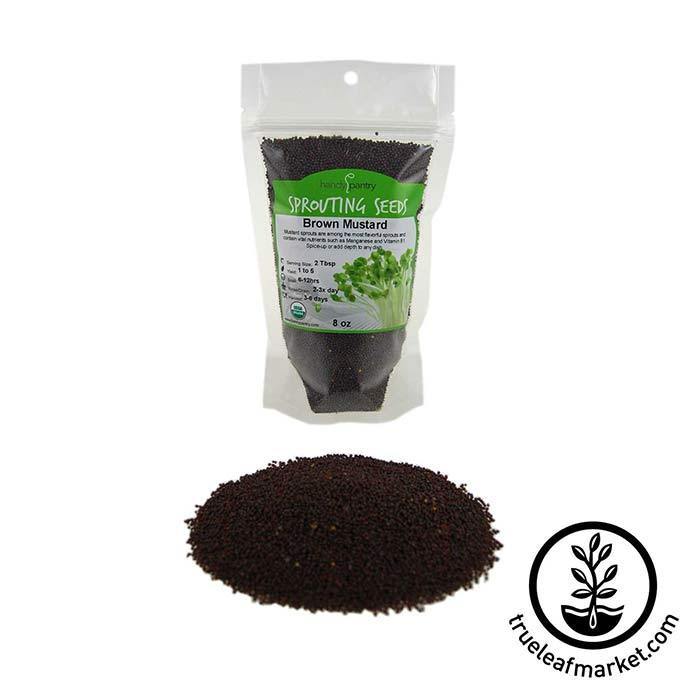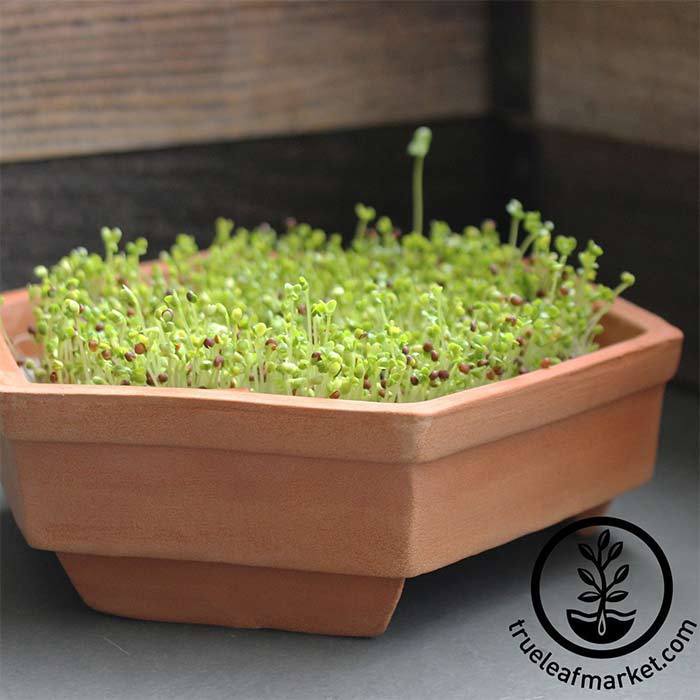Handy Pantry Brown Mustard - Organic - Sprouting Seeds
Terms and Conditions
Shipping: 2-3 Business Days
8 oz
5-6 Days. Brassica juncea. Organic. Non-GMO. Sprouting. One of the spiciest and most robust sprouts availble, non-GMO Organic brown mustard seeds sprout a nutritious companion to any number of seeds with a similar full-body kick. Organic brown mustard sprouting seeds are featured as part of the Organic Kick Mix, our signature trio blend including brown mustard, radish, and clover which was first developed for a Grand Canyon hike. Try sprouting Organic brown mustard seeds in a terra sprouter for an easy, decorative grow space. Wholesale seeds and bulk available. ~11,250 seeds/oz.
About Organic Brown Mustard Sprout Seeds
Unlike most sprouting seeds, brown mustard is extremely mucilaginous and benefits best when sprouted exclusively in a terra cotta sprouting saucer. However, if part of a mix and sprouted with many seeds at once, the mustard's mucilaginous properties will be reduced and then can be sprouted traditionally in a jar, sprout tray, or hemp sprouting bag. Non-GMO brown mustard seeds do not require an intial soaking. Steep terra cotta sprouter in water, allowing entire saucer to become saturated before sowing. Add about 2 tbsp Organic brown mustard seeds and lightly mist seeds 2-3x per day for 5-6 days, keeping mustard sprouts fresh, crunchy, and hydrated without waterlogging. Non-GMO brown mustard sprouts are quick to harvest in just 5-6 days, ready for fresh use with a robust, spicy zest similar to horseradish, only about 15 calories per cup, and rich in Protein, Fiber, Calcium, Iron, Vitamin A, B6, C, E, K. Try non-GMO Organic brown mustard as a part of our trio hiking blend Organic Kick Mix.
More Than A Sprouting Seed
Brassica juncea, or more commonly known by a number of names including brown mustard, yellow mustard, or Indian mustard, is one of the most popular spices in the world. Not only can Organic brown mustard seeds be sown in the spring as a beneficial summertime herbal and companion plant, but has recently been grown only to be mulched back into the soil as a winter cover crop and rich source of season-long nitrogen. Brown mustard crop seeds are a safer, more reliable, source of nitrogen than store bought supplements and additives because there is no risk in burning roots with direct nitrogen contact. And like Daikon radish, brown mustard seeds develop a deep taproot to break up hardened soils in overgrown and uncultivated grow spaces.
5-6 Days. Brassica juncea. Organic. Non-GMO. Sprouting. One of the spiciest and most robust sprouts availble, non-GMO Organic brown mustard seeds sprout a nutritious companion to any number of seeds with a similar full-body kick. Organic brown mustard sprouting seeds are featured as part of the Organic Kick Mix, our signature trio blend including brown mustard, radish, and clover which was first developed for a Grand Canyon hike. Try sprouting Organic brown mustard seeds in a terra sprouter for an easy, decorative grow space. Wholesale seeds and bulk available. ~11,250 seeds/oz.
About Organic Brown Mustard Sprout Seeds
Unlike most sprouting seeds, brown mustard is extremely mucilaginous and benefits best when sprouted exclusively in a terra cotta sprouting saucer. However, if part of a mix and sprouted with many seeds at once, the mustard's mucilaginous properties will be reduced and then can be sprouted traditionally in a jar, sprout tray, or hemp sprouting bag. Non-GMO brown mustard seeds do not require an intial soaking. Steep terra cotta sprouter in water, allowing entire saucer to become saturated before sowing. Add about 2 tbsp Organic brown mustard seeds and lightly mist seeds 2-3x per day for 5-6 days, keeping mustard sprouts fresh, crunchy, and hydrated without waterlogging. Non-GMO brown mustard sprouts are quick to harvest in just 5-6 days, ready for fresh use with a robust, spicy zest similar to horseradish, only about 15 calories per cup, and rich in Protein, Fiber, Calcium, Iron, Vitamin A, B6, C, E, K. Try non-GMO Organic brown mustard as a part of our trio hiking blend Organic Kick Mix.
More Than A Sprouting Seed
Brassica juncea, or more commonly known by a number of names including brown mustard, yellow mustard, or Indian mustard, is one of the most popular spices in the world. Not only can Organic brown mustard seeds be sown in the spring as a beneficial summertime herbal and companion plant, but has recently been grown only to be mulched back into the soil as a winter cover crop and rich source of season-long nitrogen. Brown mustard crop seeds are a safer, more reliable, source of nitrogen than store bought supplements and additives because there is no risk in burning roots with direct nitrogen contact. And like Daikon radish, brown mustard seeds develop a deep taproot to break up hardened soils in overgrown and uncultivated grow spaces.





